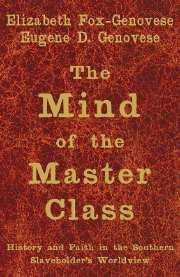Book contents
- Frontmatter
- Contents
- Preface
- List of Abbreviations
- Prologue
- PART ONE CRADLED IN THE STORMS OF REVOLUTION
- PART TWO THE INESCAPABLE PAST
- PART THREE ANCIENT LEGACIES, MEDIEVAL SENSIBILITY, MODERN MEN
- PART FOUR A CHRISTIAN PEOPLE DEFEND THE FAITH
- 13 A Christian People
- 14 Unity and Diversity among the Faithful
- 15 War over the Good Book
- 16 Slavery: Proceeding from the Lord
- 17 The Holy Spirit in the Word of God
- 18 Jerusalem and Athens – Against Paris
- 19 Serpent in the Garden: Liberal Theology in the South
- 20 Theopolitics: Golden Rule, Higher Law, and Slavery
- Coda: St. John of Pottawatamie
- PART FIVE AT THE RUBICON
- Epilogue: King Solomon's Dilemma
- Supplementary References
- Index
20 - Theopolitics: Golden Rule, Higher Law, and Slavery
Published online by Cambridge University Press: 05 June 2012
- Frontmatter
- Contents
- Preface
- List of Abbreviations
- Prologue
- PART ONE CRADLED IN THE STORMS OF REVOLUTION
- PART TWO THE INESCAPABLE PAST
- PART THREE ANCIENT LEGACIES, MEDIEVAL SENSIBILITY, MODERN MEN
- PART FOUR A CHRISTIAN PEOPLE DEFEND THE FAITH
- 13 A Christian People
- 14 Unity and Diversity among the Faithful
- 15 War over the Good Book
- 16 Slavery: Proceeding from the Lord
- 17 The Holy Spirit in the Word of God
- 18 Jerusalem and Athens – Against Paris
- 19 Serpent in the Garden: Liberal Theology in the South
- 20 Theopolitics: Golden Rule, Higher Law, and Slavery
- Coda: St. John of Pottawatamie
- PART FIVE AT THE RUBICON
- Epilogue: King Solomon's Dilemma
- Supplementary References
- Index
Summary
Is there any way to penetrate to the heart of a document – of any document – except on the assumption that its spirit will speak to our spirit through the actual written words? This does not exclude a criticism of the letter by the spirit, which is, indeed, unavoidable. It is precisely a strict faithfulness which compels us to expand or to abbreviate the text, lest a too rigid attitude to the words should obscure that which is struggling to expression in them and which demands expression.
—Karl BarthOpponents of slavery, uncomfortable on shaky constitutional ground, maintained that God's higher law had priority over all imperfect human constitutions and political arrangements. Their proslavery antagonists denied that the U.S. Constitution violated the revealed Word of God. Southern scriptural and constitutional arguments were, at least, of a piece. Together and separately, their doctrine of strict construction placed slavery at the center of the sectional quarrel and the split in American national consciousness. They identified slavery as a system of social relations, not merely a congeries of social and economic interests. Ideally, the Constitution united two social systems – the southern based on slavery, the northern on free labor – by a solemn oath of mutual toleration and respect. George Cheever, in biblical exegesis, and Harriet Beecher Stowe, in didactic fiction, agreed that southern slavery did constitute a comprehensive social system – although one they condemned as sinful, immoral, and a corrupting influence on the best of its slaveholding practitioners.
- Type
- Chapter
- Information
- The Mind of the Master ClassHistory and Faith in the Southern Slaveholders' Worldview, pp. 613 - 635Publisher: Cambridge University PressPrint publication year: 2005
- 1
- Cited by



